Nothing beats the morbid delight begot from a good old-fashioned bad dream. It’s the stuff memorable horror movies are made of. There’s no denying, being tantalised and terrified go hand in hand. But what about those bad dreams that leave you thrashing in a bed of sweat-soaked sheets and screaming for salvation? Nightmares can plague […]
Add a CommentViewing: Blog Posts Tagged with: facing fears, Most Recent at Top [Help]
Results 1 - 23 of 23
Blog: Perpetually Adolescent (Login to Add to MyJacketFlap)
JacketFlap tags: friendships, Random House Children's, Kirsten Miller, Despicable Me, Gulliver's Travels, facing fears, Jason Segel, Dimity Powell, bad dreams, Book Reviews - Childrens and Young Adult, mid grade readers, Corgi Children's, hollywood actor, Nightmares!, horror, Add a tag
Blog: Cait's Write... (Login to Add to MyJacketFlap)
JacketFlap tags: running, motivation, art, drawing, goals, facing fears, Sunday Morning Inspiration, sunday morning motivation, Add a tag
Freedom is an interesting thing. We know it’s concept and we get the gist of it all, but many of us are busy functioning amidst our daily routines and we think of freedoms only on their grandest of scale. We are grateful for the rights we have living in a free Country, but we don’t think about the smaller freedoms. The freedoms that our routines, namely being stuck to them, may be stripping away from us.

[From my Instagram]
Routine. Trust me, I’m like you and love a good routine. Routines are good, they keep us focused and working towards goals; consistency is the foundation of every major accomplishment. We NEED certain routines, yet routines are a tricky double edged sword.
Routines keep you focused. Routines can also hold your prisoner. The issues that dictate which is which are: the routine, the basis for it, and how much flexibility you allow yourself within it.
I can parallel this to running because it’s an easy example; training should become a routine. You need to KNOW you’re going to do it, don’t think of it like a ‘maybe’, you know your goals and you know you need to be consistent to reach them. You need that routine to keep you focused because running and training is hard. Frankly it’s painful and there will be times when you need to know you’re going to just have to put your head down and grind through. BUT, there are times when grinding will only leave you a broken, dull stone, so there needs to be a degree of flexibility. There are times when rather than pushing you need to step back.
Freedom outside your routine is also a state of mind. Being so busy usually means you’re perpetually distracted, or so focused on the task at hand you’re not opening yourself up to anything else. PAUSE. A mere pause, and opening yourself up to the possibility of…well, the possible.
You can’t see an opportunity if your eyes aren’t even open. What’s funnier still is that when you’re busily distracted you’re not even aware of the potential that you’re missing something!
That’s not some kind of riddle there, and it’s meaning is only best exemplified through actual experience. If you’ve had a moment where you cognitively shifted your focus, veered slightly outside your routine, and you had a MOMENT, experienced something unexpected that just, made you smile. That momentous experience of freedom is what I’m describing.
You chose to be free and in that moment you opened yourself up to have that smile….however small the experience was that brought it to your face.
You see, to get that smile, that satisfaction, doesn’t require you to veer wildly off course to the point where you recklessly abandon all goals or tasks at hand. No, it can be as simple as putting the other shoe on first…the tiniest change of routine just to show yourself that you CAN do it out of order. Who knows, you may like it. Just knowing you CAN often causes a much larger shift in perspective. You wonder what else you CAN do.
So be free. Think with an open and free mind. I challenge you to do tiny things outside of your routine and see if, by Jove, you like it.
Blog: Cait's Write... (Login to Add to MyJacketFlap)
JacketFlap tags: tips, running, motivation, goals, training, facing fears, ask me, Add a tag
Here’s an excellent question I got from a reader recently. If you’ve got any running related questions for me, feel free to drop me a line: [email protected]
Q: Hi,
I came upon your page regarding running and could not help but be very impressed. I am a 23 year old dental student in my final year and the stress of exams has got my anxiety to higher than average levels. I am writing to you regarding advice and techniques on how to relieve such stress/anxiety through the sport of running. I previously ran 5km a day, however due to recent time constraints I have been unable to match this goal. What would you suggest in terms of distance to ensure I do not spend too much time on recreational running? What intensity do you recommend I perform? And finally what supplementation would you suggest to help me improve and relieve said anxiety.
Regards,
Dr. To Be

A: Hi Dr. To be,
Thank you very much for your kind words and I’m happy to hear you’ve enjoyed my site! I’m doubly excited to hear that you’ve experienced just how much of a rush, escape, and release running can be. So much more to running than just the physical benefits it gives us!
Wow, I’m stressed just thinking about all the school and exams you’ve got going over there, congrats on pursuing your degree and making it to the final stretch! Now on to your questions.
It sounds like you were able to become rather consistent and felt comfortable with the 5k a day, but I understand that your schedule is becoming more busy. I’ll offer some tips on ‘finding’ that extra time but in regards to you wondering what the ‘right’ amount of time spent running is, there is not ‘right’ amount for everyone. Running is great because it’s incredibly individual and that means training and racing is all fit to the person, and it’s a matter of discovering what is right for YOU. For some that could be 70 miles per week, for others it’s 20. Always remember that some running is better than no running, so for your situation I’d suggest making a goal to fit in your 5k at least 4-5 times per week. That’s a good amount to make sure you keep your fitness maintained and offer you those times to get ‘out’ of school/stress/work mode and find your escape.
Some tips I have for finding that time:
1) Run first thing in the morning. Sometimes that means waking up a little earlier but it also ensures that no matter what comes up later in the day you’ve got your run done. Take the time the night before to lay out all of your running clothes and shoes so you can roll out of bed and hit the road!
2) Packed and Alarmed. If you can’t run in the morning take a bag packed with all your running gear with you to school and capitalize on ANY free moment you have between classes or find a break. You can also schedule your run time in your day and view it as any other important meeting, it’s YOU time and important.
3) Night Runner. Some people thrive off of running out the stress of the day and like to run at night. If that’s you, instead of Netflix or TV, get some miles.
4) Multitasking. I know runners who do their studying while running, be it flashcards on a treadmill, listening to recordings of lectors or study notes recorded.
Usually there are free minutes in the day, you just have to look for them. ![]()
I also wanted to let you know that the endorphins released from running actually improve creative thinking and problem-solving. Actually taking a break to run when you’re stuck with a problem or project you can’t solve will help your work. When you come back you’ll be more productive and re-energized. So you shouldn’t feel like your running time is ‘wasted’ time that you ‘should’ have been spent studying.
For workouts, if you’d like to push yourself then start by adding some pick-ups, or fartleks, into two of your weekly runs. Make sure you have at least one easy run between them. For some fun workouts, do 1 mile easy, then alternate running 1 minute harder and 1 minute easy. Come back next time and do 2 minutes hard/easy…the combinations for fartleks are endless. I have more workout suggestions HERE.
Lastly, stress management and anxiety. A really powerful tool is visualization, which I wrote about HERE, and you can apply that tactic to all other areas of life. If you’re stressed about exams, then close your eyes and picture yourself arriving to the test area calm, relaxed, and confident. You ultimately want to get in the habit of being able to put yourself into a relaxed state, with steady breathes, and then when the actual event is happening you’re able to recall that feeling of being calm. It take practice and time, but with practice you’ll become better and better at it…just as with running!
Running offers you a unique mind-space; the chemical release of endorphins plus the feeling of freedom, lays the foundation for a happier, more productive mood overall. You may find that some of your best ideas come on the run, that is the case for me! You may also find that over time, and when you’ve got more time in your schedule, you’d like to push yourself by adding more miles and different workouts. As, I hope the relationship you’ve got with running turns into one that is lifelong.
Thank you for writing and happy studying AND running! ![]()
Cait
——
Ask Me: Solving Calf Injuries
Improve Your Running By Asking Yourself THIS Question
Blog: Cait's Write... (Login to Add to MyJacketFlap)
JacketFlap tags: running, motivation, goals, injuries, facing fears, Add a tag
Running is all about dealing with discomfort. It teaches us that we are capable of handling more discomfort than we think and it always increases our tolerance for pain discomfort.
Running strengthens us and skews our perception of just what is uncomfortable.

A non-runner complains about a stomach ache, a runner doesn’t start complaining until they are projectile vomiting. But the reason that runner’s complaining is probably because it’s in the middle of a long run and they NEED to keep that gel/drink down because they need the energy, not because it hurts. ![]()
Pushing ourselves outside of our comfort zone is the only way to keep growing as a person, as an athlete, as a runner. In FORCING yourself to push, you’re setting yourself up to achieve more. The beautiful thing is that whether you wind up hitting XXX goal or not (if there’s not the danger of failing then you’re not setting high enough goals!) you’ll no doubt have improved in some way. You’ll have made progress.
The journey to progress is just as important as the end results.
Now I said it was a beautiful thing, fancy that, discomfort being beautiful. It may yield beauty but living through it is hard, painful, grueling at times.
Discomfort tests us. But when you open yourself UP to that feeling of discomfort you’ll discover that it DOES get easier. And you’ll be inching your threshold to withstand discomfort ever forward.
Running teaches us so much about life, and one of the strongest lessons is that, yes, we are much more resilient and tough than our minds want us to believe.
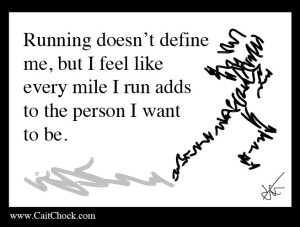
It’s a coping mechanism, our brains don’t really like feeling uncomfortable. So we have to just trick it, PUSH, and force it to keep going.
Pushing yourself to step outside your comfort level in running can be achieve in a myriad of ways outside of hard workouts. Test your range and set your sights on a short and fast 5k instead of a marathon. Improve your flexibility and REALLY start stretching, build your neuromuscular system to be more responsive and reactive with drills. All of the above may leave you feeling awkward, out of place, frustrated even…but that’s good. Stick with it and eventually things will get less uncomfortable.
You’ll wind up getting faster and becoming a more balance, performance-driven runner.
Apply that to life. Learn a new skill, be prepared to feel like a total idiot at first and BE OKAY with it. A runner’s natural tendency is to want to be the best, but you have to start somewhere. Be CONFIDENT enough to accept you very well may suck, and be SECURE enough to ask for help. Ask others to teach you. Then learn.
Finally, life and running will test you in ways you didn’t actively seek out. You’ll be pushED rather than be the one pushing. That’s scarier because you feel out of control on top of it. But you know what, discomfort is discomfort and the same rules apply.
Know that you are stronger than you are wont to believe. Embrace the discomfort and keep moving forward. You will survive, progress will come.
And at the end of the day you have the peace of mind in knowing, “I can handle it, I’m a runner for crying out loud!”
I challenge you: How will you step out of your comfort level?
Blog: Cait's Write... (Login to Add to MyJacketFlap)
JacketFlap tags: running, motivation, goals, training, intervals, races, facing fears, tips, Add a tag
Long runs and long workouts tend to scare people. It can feel intimidating looking down the barrel of a double digit run or mulit-mile repeats. We’re distance runners, we love this stuff, but large quantities of miles (especially faster miles) still intimidate us.
Running and that mental component, can’t escape the mind games. Our bodies are apt to surprise us and prove our limit-setting minds wrong…BUT it’s a matter of pushing past the mind crap (doubts/fears/discomfort) before we can be ‘pleasantly’ surprised.

The best thing about running into new territory, be it your longest run, the most number of long intervals, or the most volume of hard running, they’re all scariest before you do them. Once you’ve conquered the best you’ve proven you’re capable of it and you get a new frame of reference.
Example: You’re afraid of running 10 miles because you’ve never run that far. You then run 10 miles and flash forward a few weeks and 10 miles doesn’t scare you at all. But 14 miles does…sooo, you run 14 miles and the cycle continues.
See how DOING something takes the fear out of it. Let’s up the ante.
You can run 10 miles but now you’re supposed to run them hard. EEK!!! New challenge. Time to fight through it:
4 Steps to Get Through the Grind
1) Relax:
the first part is you gotta stop building the run or workout up into epic proportions. Say with me, “it’s just a workout (or race), all I can is my best, so that’s the goal.” Deflate some of that pressure and take the power away from the workout…give yourself the power by realizing that you’re going to give it your all and THAT is all that can be expected. Times are there for guidance and motivation to push…but you can’t let them put so much pressure on you that you implode.
2) Start: easy peasy, right? Funny how fear sort of get muted the second the gun sounds and you just START freaking running. It has a way of shutting your brain down for a bit or at least taking it down a few notches.
3) Segments: your runner-brain gets overloaded thinking about the WHOLE run (26.2 miles…holy crap!!!) so you break everything down into smaller segments. Think of it like a meal with a zillion courses if you have to. Get through the plate, the miles, the quarter mile, the repeat.
4) Fight and Lie: running isn’t easy and training is painful. You break it down into itty bitty ‘plates’ but even each bite is still hard. (can I push this metaphor any further?) You need to just cycle through the above three steps on repeat…relax, roll, be confident, be smooth…start, click the watch on that next interval and go, make it until you hear the magic Garmin beep of another mile and keep going…segment, make it 100 meters more, run until you pass that guy, stick like GLUE behind the person in front of you and don’t think how far the finish line is in front of you.
Doing all of the above is really a series of lies. The good lies that you use to ‘trick’ your limit-setting brain into proving itself wrong. Your body CAN keep going, you just have to fight like h*ll long enough to show yourself you can do it.
The cool thing is once you get through the grind you’ve just re-calibrated what’s ‘suuuper scary’. Whatever you just did won’t scare you so much next time…
…but don’t rest too easily, Runners, because that just means later the ante will be upped. That’s okay, because you know the drill. ![]()
——
“The Big Three: Talent vs. Work Ethic vs. Mental Toughness- Which matters the most?”
“Effective Mental Strategy: Race better by out-thinking your brain”
——
1) What’s the longest you’ve run?
2) What’s your favorite long repeats workout?
3) How do you get through the grind?
Blog: Cait's Write... (Login to Add to MyJacketFlap)
JacketFlap tags: motivation, goals, injuries, facing fears, bad races, tips, family, running, Add a tag
The last few days my Adobe was acting up, legit like a two year old heck bent on crippling me. I couldn’t finish work that NEEDED to be done, I cursed the computer and slammed some fists. It had turned ME into a toddler. Hot mess.
Stress. Frustration. Anxiety. We can’t avoid it in life and we can’t avoid it in running either. There are ALWAYS going to be things totally out of our control. My tantrum wasn’t going to solve the computer issues, and neither is the wildest of fits going to cure a stress fracture. Sometimes sh*t just sucks but you NEED to deal.
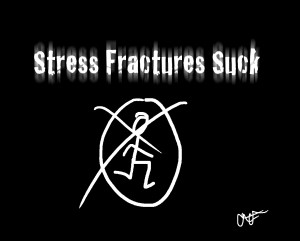
In the moment that can feel impossible but our fast-paced lives have gotten to a point where the stress, anxiety, and frustrations churning through us are destroying us. Making us sick. Clearly even if you’re not on the verge of a stress induced heart-attack or breakdown, I dare say everyone and anyone has some sh*t going on that they would do well to unburden themselves with.
What do I mean by unburdening? You most likely can’t take away or change every situation, you can’t make money float down upon you or force so-and-so to get back to you with a quote that you NEED because your article deadline is hours away.
Unburdening can be more like shifting how YOU are dealing with the situation. Adjust and learn to let go. I’m sum it up:
Do EVERY single thing you can to control the situation and make it work how you’d like it to…from there, heed to the ‘que sera, sera’.
Injury?
You get hurt, injuries come with the territory in running. Do what you can to reduce your risk but you can’t avoid them. Here are your three steps:
1) Throw your dang tantrum. You deserve it. But put a time limit on your baby breakdown. Ten minutes, a day max.
2) Get proactive. Shift to problem-solver mode (logic and reason side of the brain, move out of emotional/reactive side). Come up with a cross training and rehab routine.
3) Do it. Move through that routine and ONLY take it a day at a time. Don’t dwell on XXX weeks or months. Look at your rehab like taking your medicine…spoon full of sugar that crap down. ![]()
Bad Race or Workout
Also comes with the territory in running. Ironically the steps are eerily the same as above:
1) Mild upset is allowed. You deserve to be disappointed and that’s the same feeling that will motivate you to work harder next time. But don’t be a pouter, don’t be one of those jerks who ruins everyone else’s workout/race/day/etc. Cry on the inside like a champ. Haha.
2) Get proactive. Learn anything you can from the experience, is there a reason it was bad? Reassess your training if need be.
3) Move on. Keep on trucking. Some days your legs just don’t show up for whatever reason. Learn what you can the move forward.

Never let a bad workout or race turn you into a pessimist. That kind of perspective is what kills peoples’ passion and could ruin your love of running. No one wants that.
All that stress and anxiety [psst...don't get too nervous before races either, here's my post on that.] only makes things more of an uphill battle for you. So don’t make things worse on yourself. Unburden that sh*t.
Ironically, the more balanced and less stress you put on yourself in running the better you end up performing. There’s a little thing called over-thinking, My Friends.
Back to life because 99.9% of us aren’t running for our jobs. Which means our jobs and life events are brining us the most stress. [that extra stress will effect our running too...so if you're also wanting to run better you'll do well to unburden some life stress...logic holds there. Haha] But far too many of us let things that shouldn’t stress us out THAT much, well, stress us out THAT much.
I challenge you to let go of some little things. Lots of those things include wondering what someone else thinks about you OR complaining about someone else. A tip there, years ago I adopted the thing of not saying anything about someone else that I wouldn’t just say right to them. I’m a straight-shooter so rather than complain, isn’t it better to just go to the source and [strategically] say whatever you need to? Problem solved there.
Now for the curveballs and bigger things life will deal you often, we’ll circle back to what I suggested we do in running. Hey, like I say EVERYTHING circles back to running, right?! ![]()
1) Baby tantrums. You can be entitled to a fist pound on the laptop but put a time limit on yourself.
2) Proactive mode. Do EVERYTHING you can to set yourself for the best outcome.
3) Move the heck on. You can’t control lots of things in life, namely other people. So…”let it go.” ![]()

Stress makes you unhappy, it will also make your running harder. All the more reason to unburden some of that crap!
1) What is one little thing you’re going to unburden yourself with TODAY?
2) How do you handle BIG life stress?
3) Do you consider yourself a highly stressed and anxious person?
Blog: Cait's Write... (Login to Add to MyJacketFlap)
JacketFlap tags: tips, running, motivation, goals, races, facing fears, Add a tag
Our minds are experts in construction. They will build up fences quicker than nobody’s business. It’s actually a survival method, the brain ‘thinks’ it’s looking after our best interest, keeping us safe by setting limits.
The problem is that this survival method is archaic and antiquated, most of the fence-building is stopping us from pushing ourselves in work or running rather than stopping us from trekking too far from our caves, getting lost, and gobbled up by a dinosaur. ![]()

In breaking down your fences you are freeing yourself. Because on the other side, THAT is where you can push yourself to your best. The other problem with fences is that they stop you from even dreaming, or imaging that something epic is ‘out there’ that YOU could possible accomplish THAT! Fences keep you safe, in a comfort zone, they also suck because they rob you of really feeling and experiencing.
We can easily relate this to running in a few ways:
1) Goals: if your goals aren’t big enough to scare you a bit, they should be bigger. That said, you should know that working towards something BIG is HARD. That’s the point, that’s what makes an accomplishment fulfilling though. Just don’t be fooled into thinking there won’t be times where you want to stop…that’s where true self-motivation and dedication is tested.
2) Going in over your head: everyone needs to be in the position of going in over their head, a few times, and get comfortable with the fact that, “Yea, I might bonk” because, “Yea, I might not bonk and break through to a new level.” There are times in races where you need to not look at the clock/watch/split and just race, get swept up in the faster group…this can be in workouts too.
Confidence is a funny thing for a runner, and the watch can do wonders for it but it can also sabotage you if you ‘think’ about it too much. Example: “Holy crap!!! We’re running XXX pace, I can’t hold this…what am I doing running with these people, I don’t belong here?!!” This runner can either be intimidated by the splits or check in with themselves and realize they were actually feeling fine until they freaked themselves out. They might blow up later, but they may not, they may have their best workout yet. Either way though, sometimes you need to just stick your neck out there, break the fence.
Important to note that, duh, you shouldn’t always go on some kamikaze mission in workouts and races. I mean, a 7 minute miler shouldn’t go workout with the 4 minute miler group…let’s be sane here. The point is that for the most part, runners DO need a little push every now and again to break through to the next level. Surrounding yourself by some faster people is a great way to do that.

3) Mental ‘fences’ pain signals: for runners the vast majority of fence building is stationed around hard workouts and races. Your brain wants to STOP pretty much the second you start…haha. Steve Magness wrote a really great post all about the brain, willpower, emotions, and how that relates to a runner’s mental toughness. It’s a long read but incredibly interesting, worth it, and touches on quite a few different points, tackling it from multiple angles.
He talks a lot about willpower and how fatigue is actually an emotional response rather than a physical one. Really interesting because when you think you’re ‘tired’ it’s really only your brain reacting, worrying that you’re GOING to be too tired later to finish and shouldn’t continue. He goes on with lots of ways a runner’s willpower and mental toughness to combat the pain signals from the brain are affected. Things that make us more easily swayed to stop rather than push.
Proper recovery like nutrition and sleep are two factors…another reason to think of your training in the big picture sense. But another big mental toughness inhibitor is stress. He phrases it more as using your willpower reserves up on less important matters, but the explanation is that your brain can really only handle so much. The more taxed your brain is going into a workout or race, the less it will perform. Read as: the weaker it goes into the race, the more likely you are to cave to its complaints to relent, slow down, or stop.
Go read his full article HERE because really, there’s so many interesting points that make you think. A runner’s mental toughness is something most all of us are fixated on because it’s not finite, it’s kind of like an intangible that’s hard to explain with science. But Magness is actually able to show how science is closing in on giving us some cool explanations and theories.
The bottom line is: Runners, scr*w those fences. Start breaking them down and in doing so you’ll find that’s where the truly epic sh*t lies.
——-
More posts on MOTIVATION
——-
Blog: Cait's Write... (Login to Add to MyJacketFlap)
JacketFlap tags: running, writing, motivation, art, goals, track, facing fears, Sunday Morning Inspiration, sunday morning motivation, Add a tag
Strip away the muscles, the sinew, the bones
The flesh.
Alone with yourself.
in your mind.
A step echoing amidst chatter
doubts.Refutes.
I am stronger than you say.

Tissues beg for slack,
plead for mercy.
I want to stop.
But I do not.
Mind runs on.
Push forward against protest
myself and my mind.
Friend, nemesis, untrustworthy deceivers.
I must stop.
You may not.
Only one step more.
LIAR!
——-
The June issue of Competitor magazine features Meb Keflezighi on the cover, the story is excellent and I urge you all to read it HERE. Not all can race outside of themselves, but it’s the quest to continually push our own limits that every runner is in a similar battle. Keep rising to the occasion.
More posts on MOTIVATION
——-
Blog: Cait's Write... (Login to Add to MyJacketFlap)
JacketFlap tags: tips, running, motivation, art, goals, injuries, training, facing fears, Add a tag
A runner’s mind is filled with lies. We live in our own sort of warped reality. I’ve talked a lot about how lies are our little coping mechanism so we CAN stay dedicated and motivated to keep reaching our goals. That lies can be a good thing.
The thing is though, not all of those lies are created equal and it’s important to know which lies you should be ‘believing’ and when you need to be truthful.

Good Lies
* Midway through a workout: “I’m only doing 1 more repeat, don’t worry brain!”
* About to start a workout or at the starting line: “It won’t really hurt, I swear!”
* In moments of motivation lulls to just START running: “Just run for 5 minutes, if you want to stop then you can.
These are the lies that help us tune out the pain and call our brains out when they’re just being lazy. These are AWESOME lies and the ones you should be blasting from a megaphone because they’re coming from your inner rockstar runner. The runner who wants you to achiever your goals…believe everything they say, those lies will fuel your greatness.
Bad Lies
* Mid-workout brain chatter: “You can’t keep this pace up.”
* Starting line: “Holy crap, I don’t belong next to so-and-so, they’re going to kick my butt!”
* Mid-race: “They just surged, they must feel way stronger than me…I’m just going to let them go.”
These are all the things that weak, insecure, tired, lazy, annoying, complaining brain likes to shout at you. These are remarks your rockstar runner persona needs to refute and call-out as lies. “I am stronger than I think. I belong at this starting line. A race isn’t over until the finish line and I know they hurting too, I just need to hang onto them.”
Dangerous Lies
* Mid-workout: “What was that POP? I’m sure it’s nothing…I think this pain will just go away in a second…”
* After 6+ days of feeling like total sh*t and workout times getting progressively slower: “Just suck it up…I’m DOING this long run/workout exactly as was planned 4 months ago.”
* In life: “It’s totally okay that I’ve only slept 4 hours the last five nights and been existing on Sugar Daddies, Ramen noodles and Diet Coke.”
You get a runner, heck-bent on proving their toughness and combine that with our own ‘stupidity’ (“It doesn’t hurt THAT bad, I can surely make it three more repeats!”) and that’s when things get ugly. Injuries, Baby, injuries. Runners are always riding a fine line between good pain, bad pain, when to push, when to ease back, and to our credit it CAN be incredibly difficult to distinguish ‘right pain’ from ‘wrong pain’ and from there the degree of ‘wrongness’. I’m sure that reads like jargon to normal people, but runners totally GET exactly what I’m talking about.
The thing is, runners usually have to just learn the hard way and suffer through times when they’ve made mistakes to LEARN. Eventually you’ll come to find it’s better to err on the side of caution. It doesn’t make you mentally weak or a lame-o runner; in fact it takes more self control and confidence to hold back and issue that self-restraint.
Think of it this way. You’re running and mid-workout you definitely know something is off.
Option 1: Either slow down to a pace where you don’t feel the ‘bad’ pain or pull the plug on the workout entirely. Follow it up with some easy days and you’ll be right back into training mode after.
Option 2: Grit your teeth, finish the workout come h*ll or high water. You limp through a cool-down and the grimace never leaves your face. You ice like a mofo the rest of the day, chomp Ibuprofen like they’re Smarites and pray you’ll somehow go to bed and miraculously be fine.
What scenario do you think wins out?? Finally, what’s the WORST thing that could happen if for some reason you could have finished the workout and been fine after? The running police won’t come and yell, “SLACKER!!” at you.
Just keep working hard and remember training works on the law of averages, that single workout isn’t going to ruin your entire build-up to your Championship race.
Why it’s Hard to Admit a Dangerous Lie is Reality
On the flip side, runners sometimes grit their teeth through the ‘bad pain’ because they are afraid that if they stop they’re going to lose the ability to PUSH through the ‘right pain’. I know you know what I’m talking about because it feeds right back into the GOOD kind of lies.
Running hurts one way or another whether you’re injured or not. You can’t let your mind actively be looking for excuses to stop. So naturally there is the fear that if you pull the plug on a workout one time, you’ll start a chain reaction that results in you never being able to finish a workout. This does happen, and it’s mental suicide for a runner but here’s the thing…
…it works on a case by case basis and for lots of runners this fear of ‘losing the ability to push through pain’ is irrational. So, be honest here…you DO know good pain from bad pain, you DO know you can push through good pain, so in those pinnacle moments of needing to decide if you need to stop or not, listen to your gut.

If your bones tell you you’re in danger of really doing damage, stop. It’s not worth it. You can’t run at ALL if you’re injured.
The same goes for a runner who refuses to acknowledge they need to ease back and give their body some rest rather than keep pushing, and keep digging themselves into a hole. Again, all those fine lines, but if you’re experiencing chronic fatigue for a week or more, you need to adjust.
Training routines aren’t concrete and always need a degree of flexibility. Flexibility goes both ways, sometimes you need to push yourself harder but other times you need to know when to scale back.
Don’t dig a hole so deep you have to take a full-on break. Sometimes a few easy days will do the trick and breathe life back into those legs!
Wow, so many lies!! You see why I said we live in a warped runner reality, no?! But be smart.
Tune into the good lies and believe them with all of your heart. Then be secure and confident enough in yourself to recognize the bad lies for what they are and face the real truth.
——-
More posts on CONFIDENCE
More posts on MENTAL TOUGHNESS
More posts on INJURIES
——-
1) What’s a good lie?
2) What’s a bad lie?
3) What’s a dangerous lie?
Blog: Cait's Write... (Login to Add to MyJacketFlap)
JacketFlap tags: art, drawing, goals, facing fears, food, running, motivation, Add a tag
I run to escape. I run to be free. I run for sanity.

Go, escape into your run!
——-
#CoreAndCake Party!!! So it’s happening THIS Friday and you’re ALL invited. I’ll be sharing a new core routine to help you runners stay strong, build a more efficient running form and reduce injury risk. Talk of cake will follow. Get the gist?

I’d also LOVE for any and all bloggers and social media-ites to hop on board.
1) Blog: Get creative and share anything core and/or cake related. Fitness folk that could mean sharing some of your favorite core moves, all foodies you could make us all drool over your favorite cake recipes! Heck, so long as any mention of core and cake makes it’s way in there I’m sold!
2) Social: Snap a pic of you doing a #coreandcake related celebration and Tweet/FB/Instagram it!
3) Link: If you’d like to be included in some blogger link-up partying, email me at: [email protected] with your link!
Looking forward to our runner part. ![]()
———-
1) Finishing the sentence…”I run to/for…”
2) Share a time when going for a run lead you to figure out a problem, get through a tough situation, or acted as your escape?
3) Favorite dessert?
Blog: Cait's Write... (Login to Add to MyJacketFlap)
JacketFlap tags: running, motivation, art, goals, facing fears, Sunday Morning Inspiration, sunday morning motivation, Add a tag
Word.

———
More Morning Running Motivation
Your INVITE to the #coreandcake party! (scroll down to bottome)
——–
1) What’s on tap for your weekend?
Blog: Cait's Write... (Login to Add to MyJacketFlap)
JacketFlap tags: tips, running, motivation, goals, facing fears, race tips, Add a tag
Let’s talk fear. Okay, I’ll break the silence and let you in on a dirty little secret: EVERY runner has fear. Regardless of how fast they are, how much they’ve accomplished, the Gold medals sitting in those shiny cases…every, single, runner has fear.
Fear isn’t necessarily a bad thing, it just means that you WANT something. You have goals, you want to hit them and you’re scared/nervous/anxious because if you fall up short…then what? Fear merely proves you have goals that MATTER to you.

With running there is also the fear of the pain. BAM. I just touched on the TWO big taboos runners are never to speak of in the span of less than 150 words: fear and pain. Knowing that pain is going to be there, that you’re going to have to be mentally tough and push through that pain, that you’re NOT going to let that pain break you…that’s also where a large part of a runner’s fear comes from. And it also explains why, every runner, regardless of how good they are, be they professional or back of the packer will harbor some ‘fear’…every runner goes through pain. It’s part of our sport.
Now the thing is, the big difference between elite runners who race like ballers and every other runner who races like a gamer and the runners who implode is: the gamers don’t let the FEAR rule them. Gamers rule the fear. They turn the fear around, use that energy more as nervous-excited rather than nervous-fearful/worried. See the difference? It’s all in the mind.
Not letting fear rule you is difficult, even the most experience runners go through periods where they may struggle and need to get back on track. And to be honest, there’s always going to be a point in a race or workout where you’re riding a fine line between keeping your fear in check, “Am I seriously going to believe I can make it at THIS pace for THIS much longer?”
Combat The Fear
* Find Your Confidence:
Not letting fear rule you means you push those doubts aside with reminders of why you ARE a gamer. Think of past workouts, know that you’re mentally tough, know you’ve survived plenty of times when you’re mind began to doubt your ability…and you proved that silly mind wrong.* Find Your Mojo: Tap into that confidence and a part of that is just realizing WHY you’re doing something. Without the ‘why’ as a driving force it’s easy to just let the fear take over and not give a flip over the outcome. Set some goals and know WHY you’re willing fight through this fear and OWN it.
* Relax: The thing with running and pain and then running through that pain, if you try and ‘fight’ it you usually wind up running slower. Kinda like you just have to ‘relax’ into the pain, let it come, than do your best to just numb it out. If this makes sense? To put this into more ‘physical’ terms, a good way to describe it is to just make sure your form and body is relaxed, you’re not clenching your jaw or fists or scrunching your shoulders up near your neck. Relax your body, relax your mind, don’t ‘try too hard’ and don’t ‘fight it’.

Everyone has fear, and that spans across all areas in life, but I’ve always found the best way to rule your fear is to DO what’s scary and prove that you lived through it. The more times you get through it, the less scary it becomes because you’ve built up your confidence.
I’ll tell you what helps me, and I’m be brutally honest, I say it like it is to myself, “Stop being a freaking idiot, just effing DO it.” Now, usually I’m not fearful of workouts, but I ultimately realize that the fear is stupid. Just effing do it would certainly apply across the board though, and with running sometimes that tough love is what you need. ![]()
As for running, you can never let fear of workouts or racing turn into a monster: 1) because that sucks any fun out of running in the first place 2) you’ll implode in the workouts or races. Rather, just STOP thinking so much and freaking start. Just get going, relax, and roll with it…fear be da**ed.
The reason I feel it important to SHARE that EVERY RUNNER has fear is because you shouldn’t feel like a weakling just for having fear. You’re only a ‘weakling’ if you let that FEAR rule YOU. If that’s the case, don’t lose hope because you can always turn that around…tap into your confidence and race like the GAMER you want to be. ![]()
——–
I wanted to do a post on fear because it came up in a really great article by Jason Fitzgerald at Strength Running. Read “7 Quick Lessons from my 16th Place Finish at the Rock ‘n’ Roll DC Half Marathon” because it’s filled with tons of important recovery tips for runners. The bit on doubts is what triggered my idea for this post. SR is a great resource for runners, so go, stay and check out all his awesome reads!
I also talk a lot more on the mental side of running and tips to tune out that pain in my ebook “Effective Mental Strategy: Race better by out-thinking your brain”
——–
1) Fear is ever-present in running and in life. What is the last things you had fear or anxiety about?
2) How did you deal with that fear in a positive, GAMER way? Or did you find that fear won that time?
3) The last time fear won, how did you learn from that experience and make it so you can overcome that fear going forward?
Yo, we all lose sometimes, it’s just important to learn and make that a productive ‘loss’.
Blog: Cait's Write... (Login to Add to MyJacketFlap)
JacketFlap tags: running, motivation, art, goals, facing fears, running shirts, Add a tag
My BIG NEWS: I started Ezzere, a brand for my running shirts!!
My mission in starting Ezzere is to inspire runners, make you dream goals big enough to scare you, and GO for them! Then, keep you looking good at the same time. Look good, feel good.

Check out my new site Ezzere.com and help me spread the word!

Run. Laugh. Be.
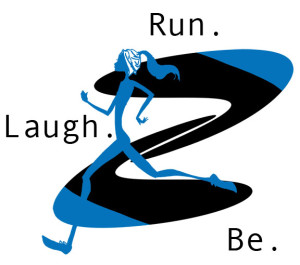
Blog: Cait's Write... (Login to Add to MyJacketFlap)
JacketFlap tags: training, track, facing fears, tips, running, Uncategorized, motivation, goals, Add a tag
So one very hot singer has crooned, “Speed kills…” Well any runner can tell you that one! It’s a little two-fold though, speed kills your opponent and if you consider the lactic acid factor it probably feels like you’re killing yourself too! ![]() Remember THIS cartoon??
Remember THIS cartoon??
It’s true, us distance runners, of the slow-twitch muscle fiber realm would most likely opt for a 10 mile tempo than sets of 800′s or 200′s. Distance logic right there.

The thing is though, while you can’t inject your distance running legs with fast-twitch muscle fibers you CAN hone the ones you’ve got and it’s quite remarkable how malleable that muscle make-up can be with proper training. But here’s the thing, for long distance runners, GETTING FASTER takes both a physical and mental component.
Physical
I’ve written a few articles on the specific physical training tips to run faster. Distance runners SHOULD embrace those horrid 200 repeats, choke down those shorter intervals because speed translates up. You need to reverse ‘common’ distance logic and build from the bottom (aka shorter distances) up.
The faster you can sprint, the faster you can comfortably hold a ‘slower’ pace and longer. That reads as faster 5k’s, 10k’s, and marathons.
Do those shorter intervals, add some hill sprints, anything that involves explosive power. That’s the muscle-building and training factor.
Mental
Here’s the thing, if you’re like me you HATE that short running stuff because you ‘feel’ like you suck at it. You feel out of your element and get stressed more for the short stuff because it feels awkward, doesn’t come naturally, and thus gets a little frustrating.
ALL those thoughts create is PHYSICALLY impossible to run your best sprints. Crazy how the MIND can once again stop you from being the best runner you can be. The thoughts of feeling ‘out of your element’ create a foundation for stress and rather than running RELAXED as you should, you’re running tense. Ironically the more you ‘try’ to run faster, the slower you’ll be. True fact.
Learning and reminding yourself to run relaxed is an ongoing process. Here are some mental thoughts that can help you stay relaxed and allow your body to run faster:
* Arms: Laws of running physics (?? lol) hold that your legs can only move as fast as your arms. I like this because rather than think about your legs (let’s be honest they’re hurting like mad, let’s NOT think about them at all to block out that pain!) I think of moving my arms front-to-back as quickly as possible. The legs will follow.

* Eff It: This is the mentality I’ve adopted during short intervals, but let me explain. I KNOW ‘trying’ to run faster will shoot me in the foot, so I force my type-A brain to do the opposite. I remind myself, “Don’t worry about the times, I know speed isn’t my strong point, but it will only improve if I work on it. So eff it, relax, you can’t FORCE anything so just roll with it.” Basically you have to embrace the ‘awkward feeling’, loosen up, and just ‘have fun’ with it. Also, stop telling yourself that you suck at the shorter intervals! ![]()
* Effort: Tying to my tip above, ultimately running and training comes back to perceived effort. The watch and numbers only tell part of the story, so another thing I tell myself is, “Just run hard.” Run faster and even if you don’t look at your watch (this can help runners if they have built themselves a little speed phobia) if you’re running HARDER and FASTER you’ll get the rewards.
Bottom line here: even distance runners NEED speedwork if they want to run their longer races faster. Embrace the nasty shorter intervals, adopt the ‘eff it attitude’ and stop FORCING it. Relax the heck up and in true ironic distance logic you’ll run faster when you’re ‘trying’ less. ![]()
1) Speedwork, love it or hate it?
2) When is the last time you did speedwork?
3) What’s something you tell yourself to make sure you’re running relaxed?
Blog: Cait's Write... (Login to Add to MyJacketFlap)
JacketFlap tags: art, bad races, running, Cartoons, motivation, goals, injuries, facing fears, Add a tag
Runners can never, ever fear ‘failure’. In fact, failures are NOT a bad thing. To fail means that you set a high enough goal. You stepped outside your comfort zone, you DREAMED you could achieve something great.
Failures are often the most powerful learning tools. Bad race, horrendous workout…you have to not only experience them you have to FORCE yourself to get through them. Soak up the experience, actually feel how much that suckiness that was.
Take those sucky feelings and channel them into:
motivation
determination
confidence.

Confidence, you say? Yes, confidence.
A runner who pushes through when things really suck should be brimming with confidence. It’s way too easy to run an amazing workout when your legs feel like gold. To have a phenomenal race when it happens to be one of those ‘magic days’. Magic days are the exception, legs that feel like they’re running on clouds are the rarity.
To grit out a workout and keep your mind IN THE RACE when things are tough, that is mental toughness. The same goes for obstacles and challenges you didn’t expect, sudden curve balls that really test you. Get through them, keep moving forward. Those experiences, those trials, the hard times, even when you put in your best effort and the clock is brutally honest…THOSE are necessary to build a strong runner.
You survive knowing you still put in your best and never mentally gave up when things get tough, and that should give you the most confidence in the world. Those should make you think, “Look, I got through it and stayed tough when I felt like crap. Just imagine how well I’m going to run when my body and my legs feel GREAT.”
Redefine failure in your mind. After a bad workout or race, yes, you are allowed to be miffed, to be peeved. But channel all of that into a productive mindset. Rather than think as a defeatist, use the burning embers of anger as fuel for motivation and determination. Then look for any lessons you can learn from the race. (Did you go out too fast…again?? Wise up! haha)
Then COME BACK. The only time a failure SHOULD make you embarassed is if it’s the end of your road. You give up and stop your story right there.
I want you to now share with me YOUR epic fails turned epic wins. Share your stories about an obstacle you faced, overcame, and came out a stronger runner and person because of it. Tell me also about your epic fail of a race, and either tell me how you came back later to make it a ‘redemption race’ epic win…OR…if you just had this epic fail tell me how you’re going to use that in a way to reach an epic win.
You can blog about, post a picture, make some artage (you know how much I’d really love that!) and then tweet me @caitlinchock with the hashtag #epicfailWIN and a link to your epic fail win moment/story/picture/etc.
So, Runner Friends, embrace your failures because they make you stronger.
1) You know what to do, get to gather your epic fail win moment…I can’t wait to hear all about them! #epicfailWIN
Blog: Cait's Write... (Login to Add to MyJacketFlap)
JacketFlap tags: tips, running, motivation, addictions, races, facing fears, Add a tag
The moments leading up to a race are this crazy mix of emotions: excitement, anticipation, terror??, chomping at the bit eagerness, hope, motivation, forced relaxation (attempted??)…flip, you name it! Poised at the starting line, every runner can relate to the feeling that they just may burst if that freaking starter doesn’t fire the gun! CRACK!!
Adrenaline, cortisone, hormones flooding the body. This is the internal environment of your body before the start of a race. This is stress on the body. I read an interesting article in Fast Company, it’s actually a business piece and questioning if the brain can actually be addicted to stress.

This is your face yelling at the starter to just, “FIRE THE GUN!!”
After-all, stress puts the body into that fight or flight mode. I think everyone can relate to the rush you feel when you’ve waited until the LAST second to hit a deadline…some people are even convinced that their best stuff comes under that gun of procrastination. But stress is physical, the brain releases certain chemicals, the nervous system operates differently.
The same happens with runners. Many of those same chemicals are coursing through your veins leading up to races, and even workouts. We know those feelings, we know that buzz, and heck, I’ll totally agree that feeling is addictive. Why do you think us runners keep signing up for races, go out to nail that next workout, we love the rush that comes with it. Mostly the rush that comes AFTER…but the whole experience in itself is darn-right thrillingly addictive.
The problem though, is putting your body through that entire hormone/chemical crazed onslaught is wearing. Your body would literally explode (well, probably not literally actually) if it was in that heightened state forever. And the body DOES start to deteriorate if you put and keep it in that state for too long.
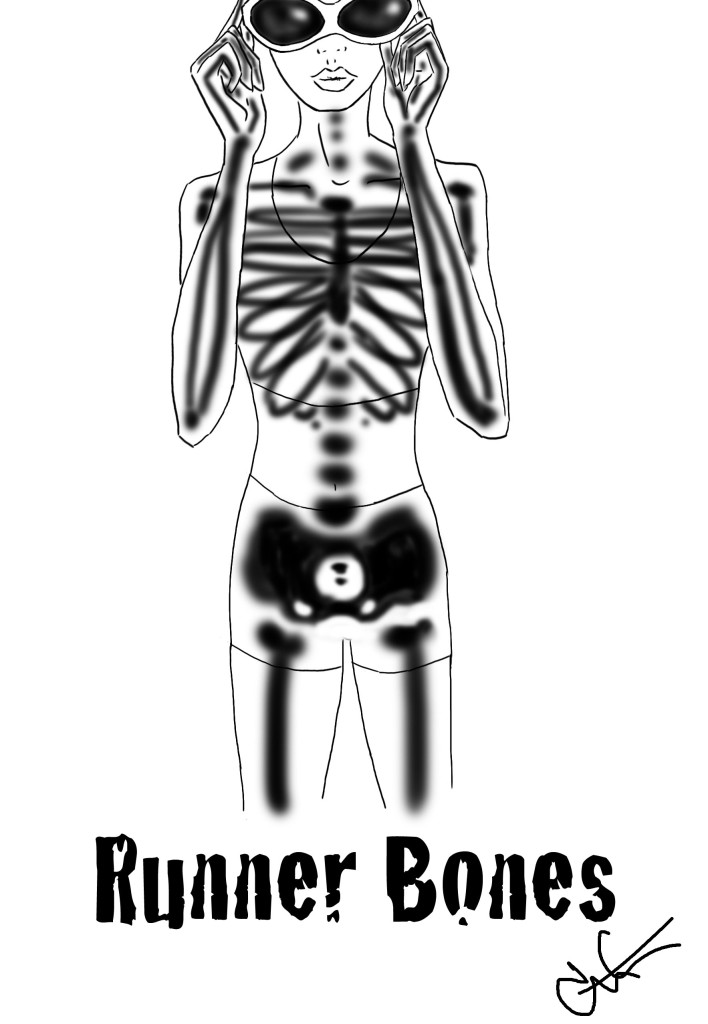
Add some hormones to those bones and we’ve got it.
This is where runners get into trouble when they let their nerves get the better of them and they (literally) explode in races and workouts. Bwahahaha…when I say explode here, I’m actually meaning implode. They Bomb.
You have to keep all that nervous energy in check. As an athlete you need to, to a degree, control the release of all that adrenaline, cortisone, and all the other crazy hormones. Overriding that body’s natural instinct of fighting or flighting mode is difficult, and takes work. Naturally some athletes are just BETTER at mentally managing that, they’re the gamers. The trickier thing is, as with natural talents, describing HOW they do it isn’t something they can really put into words. They just DO it.
Though controlling your race and workout day nerves is still a skill that is totally possible. And just like mental toughness, it’s a skill that every runner continually hones and learning to get better at is a process. You find tricks that work, not everything works for everyone…and it’s like trial and error. This is where you take any and all bad races/workouts and use them to your benefit. Did I learn something that didn’t work here? Did I learn, then, what I’m going to try next time to make things work? Looking for key lessons from bad workouts includes both physical and mental things.
A bit of a personal thing here, I’ve always loved racing. That feeling is fan-freaking-tastic, and (this never happens, brace yourself, I never blatantly give myself a compliment. Ever. I’m working on that, but I’m petrified people will think I’m bragging! So I want to preface this with I’m not bragging, but this is something I’m kinda proud of.) when I was racing I was able to manage and handle that race day nervous energy well and perform better than my workouts suggested. So I’ll kinda share what I think helped me….I always remembered this:
Interestingly the calm slips away the moment the gun in fired. I think THAT, the wanting to just get into the calm zone, at least for me, was most of the reasons my skin would crawl, itch, buzz, wanting…craving the gun to just go off. Let’s just start doing this thing!!
Anticipation is always the worst feeling. In a roller coaster, it’s the anticipating the drop that sucks, the oddly freaky sensation of your stomach lifting, that’s the fun part. Just like running where we battle the love-hate relationship with the pain of racing, it’s a love-hate thing with that stomach dropping feeling. I think a big part of the nervous anticipation is that we KNOW there is a tug-of-war about to ensue…and we (hope we are!) want to be TOUGH enough when the true test comes. We know we’ve been tough before and loved/embraced that sensation…so we need to remind ourselves we will be just as mentally tough again and come through with sailing colors. Knowing that the crack of the gun will unleash the inner gamer in us all, is reassuring.
It’s the anticipating, wait for the gamer to come out, that makes us want to grab the starter pistol and fire it ourselves! With the CRACK come the relief…the release. The moment that happens, our bodies know what to do. What, as runners, we’ve conditioned them to do. With the crack of the gun we FINALLY, liberatingly are free of thinking.
1) Stress…love it, hate it, think you can be addicted to it?
2) Do you think runners are ‘addicted’ to the feeling of racing and workouts?
3) Do you think my little anticipation theory is anywhere close to something that resonates with you?
Blog: Cait's Write... (Login to Add to MyJacketFlap)
JacketFlap tags: running, motivation, art, goals, injuries, intervals, races, facing fears, race tips, bad races, Add a tag
Sometimes a runner’s already won the race before the gun’s even goes off. Questions. Doubts. Insecurities. None of these belong at the starting line; starting line of a race or a workout. A runner needs confidence. NEEDS it… no amount of physical endurance, speed, or fitness can make up for it.
How one steps to the line is what separates the GAMERS from the runners who perform at about the level they do in workouts, and then harriers who self-implode.

Confidence is a tricky one, it’s a mental factor of running and training. Once shaken, a runner’s confidence can be quite difficult to fully restore. Injuries, off days, strings of bad races, all of these plant seeds of doubt. Doubt is like a monster that, once you feed it, it grows exponentially in size. It’s a voracious monster that will eat a runner whole. Step to the starting line enveloped in that ugly monster and you might as well not even wait for the gun to crack. You’re already a dead runner ‘running’.
By the time you step to the starting line, there is NOTHING you can change about the past. Stop any questions of, “Should I have done…?”, “Did I do enough…?”, etc. You can’t do it, so no use worrying about it.
Don’t let that scare you off, if you’ve got some doubts, that’s only natural. And if you’re currently fighting from falling into the pit with that ugly doubting monster, THERE IS still hope for you yet. It works two ways. You CAN restore your confidence. You CAN still step to the line a gamer. It just takes some work and shifting your thinking.
Usually doubts start from one of two places:
1) An Event: Events would be after injuries, poor performances, etc…it starts with a legitimate reason to question if your fitness is off and snowballs. Usually the first race or workouts back after an injury a runner naturally goes in with a little more trepidation. You need some solid performances under you belt to steamroll that confidence train back.
To help BOOST that train, remember that your talent and fitness never goes away. Your first race back may not be your PR, but trust in the process, trust in your dedication, and trust that you’re only going to improve from here.
2) Anxiety and Stress: Anxiety and stress tend to spike around pre-race time. I wrote whole posts HERE and HERE on how to use those nerves to your advantage. If you let too much pressure, internal and external, load you up, it’s like running with a weight vest. To help unload that pressure, usually it takes the runner looking within THEMSELVES and finding that passion and love for running that brought them to the sport. If they can get back the excitement and joy for just running, eventually the times, workouts, and races will get back on track.
Ironically, the LESS you think about races and workouts, typically the better you’ll do.
Remember that NO race is the last race in the world. Yes, it can be a Championship race or a PR you’ve been wanting to pop FOREVER…but know that tomorrow will always come and another race will too.
1) Where do you draw your confidence from before a race?
2) How do you use a race day atmosphere to BOOST your performance compared to regular workouts?
3) Have you ever had a time when your confidence was shaken, how did you get it back?
Blog: Cait's Write... (Login to Add to MyJacketFlap)
JacketFlap tags: facing fears, treadmill running, running, Cartoons, Add a tag
Some things are so scary they can only be real…true tales of running nightmares!!
This story comes by way of a runner in Minnesota. You know, one of those states that actually gets REAL winter weather. No, the scary part isn’t the snow, wind, or temperature reading. That’s just freaking wrong.
With all the advancements we’ve made in the world, running and otherwise, one would think we’d have solved this whole ‘power outage’ issue. I mean, c’mon, we’ve landed on Mars. But I digress.
Minnesota. Dead of winter. Night. Running outside is clearly not an option, unless you want to wind up with frost bite on your nose and unconscious from slipping on black ice. Treadmill it is.
WHAT?!?!? Power issues, FIVE BLOWN FUSES?!?! What is a runner to do? Enter the Running Nightmare Zone. This quick-thinking runner, in what can only be described as a true Running MacGyver moment, rigged up the treadmill off of a remaining circuit and…

…got the treadmill working. No lights, no problem, that’s what a flashlight is for.
The runner was quoted, “You can take a lot of things away from me, but my sanity won’t be one of them.” AMEN!!!
Scary.As.All.He##. Stay safe, stay sane, stay running, My Friends!!
**Names have been omitted to protect the traumatized ![]()
1) What’s one of the craziest situations you’ve been in to get your run on?
I’m actually embarrassed to say…it’s crazy.
2) What’s a true running nightmare tale you’ve lived through?
3) What’s the last scary thing to happen to you on a run?
Just this shady looking dude I passed, it was dark, I definitely ran wide and picked up the pace.
Blog: Cait's Write... (Login to Add to MyJacketFlap)
JacketFlap tags: running, Cartoons, motivation, goals, injuries, facing fears, Add a tag
Running as an underdog rocks. Being an unknown is easy, and it’s just as fun to shock people. But shock wears off and then expectations can start to build. The thing is, EVERYONE has failures, set-backs, off-days and that’s when the critics start. The underestimating.
Dealing with nay-sayers comes in running and it comes in life. The thing is, you can USE those crappy words to your advantage. Let them underestimate you, let them think you’re not capable.

The times you get into trouble are when you start to doubt YOURSELF. Everyone have doubts, those moments of weakness, but the key to keeping those moments fleeting is by looking within yourself and believing. Believe in your abilities and your goals. Much easier said than done, certainly…kind of like saying running is just putting one foot in front of the other and then go really fast.
The mind is quite tricky, it can fool you into believing you can’t. But you can also fool IT…it’s all in how you think of it. Confidence comes in waves and it’s malleable; to get to the point of BELIEVING in yourself you sometimes just need to fake it ’til you make it.
Everyone has doubts, the people who achieve their goals do two things:
1) They set goals with passion. It has to REALLLLY mean something to you, because you’ll have to work your @$$ off to reach them.
2) They refute their doubts. When you catch your mind slipping, “I don’t think I can do this” you need to refute that, “H*ll yes, I’m doing this!” It’s not a question.
Of course goals can change, and there is a difference between being totally delusional and just confident in yourself. Certainly. Sometimes you have to be flexible and wise enough to know when the current course for your goals isn’t working and THEN you adjust. Just like with a training program, you need enough flexibility to know when to change the workout, tweak the plan.
But with confidence, you can’t let others shake you. In fact, once they start to underestimate you and your abilities…you’ve once again become the underdog, do you not? And everyone knows being an underdog rocks! ![]()
———-
Confidence at the starting line of a race or workout is imperative, read my post HERE on how to be a gamer.
Sometimes expectations feel like pressure, but they shouldn’t. THIS POST is all about handing pressure.
Posts on how to set goals with meaning HERE
———-
1) When has been a time that you’ve been an underdog?
2) When was the last time you’ve dealt with nay-sayers? How did you prove them wrong?
3) When you’re having a ‘low confidence’ moment, how do you push to refute your doubts and believe in yourself?
Honestly, it’s SUPER hard, and everyone struggles. You refute even when you don’t believe it in the moment, and it’s okay to seek out the support of others who believe in you. And in those ‘lows’ remember that your confidence comes in waves and you need to just make it to that next ‘high’.
Blog: Cait's Write... (Login to Add to MyJacketFlap)
JacketFlap tags: goals, training, facing fears, tips, running, motivation, Add a tag
A runner’s brain is constantly being flooded by sensory input information. Feedback from the muscles, skin, lungs, eyes, ears, feet, nerves from everything. It’s a matter of taking all of these messages and warping them into what is in the runners’ best interest.

The Physical Messages
Typically the loudest feedback responders are going to be from your muscles and lungs. Here comes relays from your cardiovascular system and lactic threshold responders. The muscles announcing they are being worked, those mitochondria are breaking down glycogen and supplying your energy to run on; they are attention mongers demanding to be credited for their work.
These are pretty basic, primordial messages to your brain. Instinctual. You can’t change that these messages will be sent and that they are mostly containing shouts of pain, complaints, and fatigue.
You can’t control what messages are coming in while you are running but you CAN control how you interpret them. A runner that is mentally tough is able to manage and get as close to ignoring certain sensory feedback as they can.
* Anticipate: Incidentally the ability to manage what your legs and body are telling you while you run starts before the first step. This is anticipating the uncomfort in pain. It is a reality, but it is one we must both accept and deny. Accept the race and workouts will hurt but deny that we will let that pain break us. Anticipating the pain is a lot different from fearing it.
* Realize: Once you realize that EVERYONE will hurt when they push themselves running, not just you, a runner doesn’t feel alone. Admitting pain is present is not a weakness, admitting that these workouts are tough isn’t a weakness…it only becomes a weakness when you start to believe you can’t do the workouts.
* Assess: As you run assess the messages you’re being told and start to ‘sort’ them. Pain of a workout is present and it’s a different pain from that of an injury. Sort the ‘usual’ pain into the ‘ignore’ pile and be attuned to the ‘different’ pain.
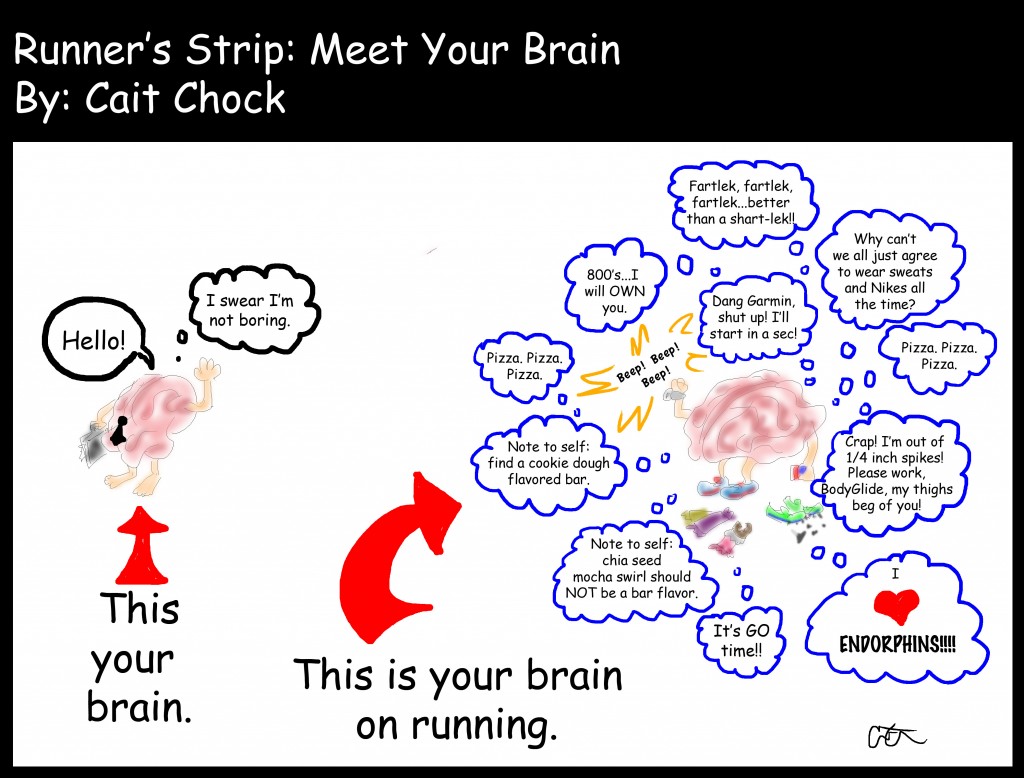
* Reassess/Rework: Now that you have the ‘ignore’ pile it’s time to reassess those messages and rework them. We’ve acknowledged you can’t STOP them from coming in but you override them through a runner’s coping mechanisms.
1) Visualization- By practicing how you will be running beforehand you condition yourself to stay positive and controlled DURING your running, racing, and workouts.
2) Self-Talk- Mantra’s work well, flip the ‘I can’t keep this pace up’ into something productive like, ‘I am strong’ or ‘I will not let this break me.’
3) Focus on Controllables- When the pain of running becomes more intense hone in on the ‘controllables’ like stride, form, and breathing. Counting steps or breaths acts as a distraction.
4) Goals- Always set goals for your running workouts and races beforehand. Don’t ambiguously go in because without concrete numbers or goals it’s easier to let your brain talk you into just ‘settling’ and giving up when the pain starts.
5) Selective Denial- We come back to runners living in a kind of state of denial. The lies of, ‘I’m only running one more repeat/mile/5-minutes/step’ get us to the next point, where we then lie again.
Confidence
A runner draws confidence from a lot of places: past workouts, a full season of training, race times, other runners they train with that have faster PR’s, etc. A large part of being mentally tough is being confident that you can WARP the messages coming into your brain and OVERRIDE them to push through the pain.
This confidence is built up the longer you run, the snowball effect. As with all other rules of running it hinges upon consistency, consistently proving you can push through the pain. There are margins for error and just like bad races there will be days where you don’t do a great of a job running and overriding the pain messages as you know you’re capable of.
You get through the bad days, learn where you went wrong, and then take those lessons into your next run.
Let your running be ruled by expertly brain warping that flood of sensory feedback from your body. Don’t let the messages steal your confidence because you CAN run and do a lot more than your body would like you to believe.
1) Anticipating the pain isn’t fearing it; fear takes hold of you and consumes your running confidence. What is a refute you use to keep this anticipation in check? (ie: remember times you’ve pushed through pain, mantra, pre-race hyping yourself up tactic, etc.)
2) Give an example of how you take assessing an incoming message you want to ignore and then reassess/rework it.
3) What are a few of the ways/places you draw confidence as a runner?
Blog: Cait's Write... (Login to Add to MyJacketFlap)
JacketFlap tags: facing fears, bad races, running, motivation, Add a tag
It’s ‘easy’ to run fast when everything is going right. Ideal conditions, you’re hitting perfect splits, the legs have POP. The thing is though, the real test of a runner and their mental toughness is how they respond to all the other days.
There will workouts in heat, wind, and rain. Runs where, for whatever reason your legs just don’t ‘show up’…they are flat. Other times you’ll be left gutting out a really tough workout but forced to run it solo. But you can’t take those things as EXCUSES. FACTORS, certainly, perhaps you’ll have to adjust the workout, but don’t start looking for a cop-out.
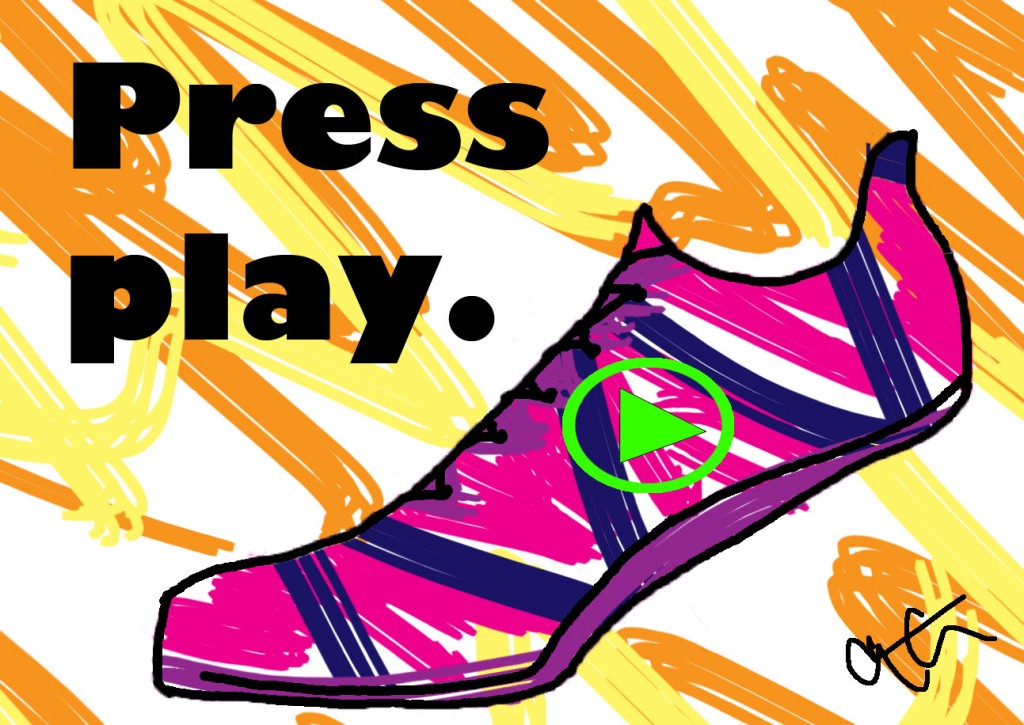
See, your mind is an expert manipulator. It’s already looking for ANY kind of excuse, viable reason to tell you to stop this silly running, ease up, slow down, cut yourself some slack. A runner’s constantly working against that sort of ingrained human trait, to push past the limits the mind is imposing on the body.
A runner must combat the voices of doubt and complaining already…think of it like a basal level of white noise in the background that you must ignore just to get out the door and running the first few steps. Hard workouts up the ante, taking that constant background chatter and giving it a megaphone; you’ve got to not only ignore it but COMBAT it by telling it to, “Shut the h*** up!” Gearing yourself up to run hard takes extra mental reserves, through the course of the workout the amount of positive self-talk escalates as you tire, as the pain REALLY sets in.
Running that hard workout when things are all falling into place, the momentum of hitting the splits and you’re clicking, is infinitely easier than when even ONE thing is off. (ex: it’s hot out) That single ‘off-factor’ and your mind JUMPS on the opportunity for a cop-out, “Just cut yourself some slack, I mean it’s hot out.”
Ease up and that quickly can morph into this the next hard workout: “Just cut yourself some slack, your legs just feel flat today. It’s not your fault…just ease up today and next time when your legs feel really good we’ll go hard…deal?”
See, that slippery, manipulative brain of yours works fast. You can’t wait for that ‘perfect’ day for a few reasons:
1) PERFECT: Those fan-freaking-tasting workouts are the anomaly, wait around for them and they darn well may never come.
2) VICIOUS CYCLE: Start giving in to that whining brain every time the pain sets in and things get tough and it’s the snowball effect. Soon you’ll be pulling out every time you have a hangnail on your pinkie toe.
Bad workouts and horrible races happen, they actually make you a TOUGHER runner because if you can mentally get through them, stay strong and still give it all you had for the day, you’ll prove something very important to yourself:
I can run when it sucks. I can run better when it doesn’t suck…but I CAN run when things are really sucky.
Those mental battles, where you win, build confidence. You need that. Conversely, take too many of those excuses to not still give it your all out there running and you get used to it. Getting used to that is like the kiss of death for a runner…it’s like a fatal virus. Because running hurts, despite how much we must deny it to ourselves for the sake of actually doing it.

You have to be tough to be a runner. The TOUGH runners are the ones who battle through even when the splits are off, they get stuck in no-man’s land during a race, and they’re doing a hard workout by themselves.
Some of the workouts you should be most proud of may have been where you were running horribly off pace, but you got through it. You were TOUGH. Next time, when the legs do show up, the times will come but you’ll have the extra confidence of knowing you can run hard when things suck.
1) Weather is certainly something to FACTOR into your workouts of course and adjust the times. How do you plan to adjust due to the elements and conditions outside of your control?
2) How do you handle the workouts where your legs just don’t show up for the day? What kind of positive self-talk do you turn to?
3) Share a workout or race that you are proud of for your mental toughness, maybe a part of the story the actual numbers can’t fully recount.
Blog: Cait's Write... (Login to Add to MyJacketFlap)
JacketFlap tags: facing fears, running, writing, motivation, goals, Add a tag
I’m a runner, but to pay the bills I’m a writer. In doing some reading for work I came across an article highlighting a few of the traits that the author felt made Steve Jobs the incredible innovator that he was.
The thing is, be it a creative dreamer in the business world or a motivated runner with aspirations, many of the traits that will get you to the top in one apply to the other. A goal is a goal after all, being goal-driven and having the ability to persevere comes down to pretty much the same things.
The Entrepreneur article was a good read, but I found myself hearing echos of themes I’ve written about right here.

PASSION. Do what you love and regardless of outcome never forget that you love it. Running is wrought with highs and lows, to get through the tough times you need to remember that underneath it all, you really do have a genuine love for running in the purest form. Running fast is awesome, but running as a stand-alone needs to be your passion.
CURIOSITY. I’ll stretch this to mean more having the ability to wonder, “What can I do?” Run curious. Run for the journey of finding your best. Dream epic goals and go for them. Even if you fail you’re still better off than being moved to shoot for it.
NO FEAR. They say Jobs wasn’t afraid of failing, good. Because you shouldn’t be afraid, failures happen. They are unavoidable, you learn from failures and the epic fails of races and workouts make you BETTER. Or rather, they’ll make you better if you’re able to learn from them and apply those lessons going forward.
Running may be better different than business in a number of ways, but getting to the top of something takes the same qualities regardless. This works even if the ‘top’ is your personal best. That’s the remarkable thing about running, even if you’re never going to realistically set a World Record or win an Olympic Medal you can still take the journey. Have the courage, tenacity, and CURIOSITY to take the trek to find your best.
Run curious, my friends. Run without fear. Run with PASSION.
1) What is a trait that you had before you were a runner that has helped your running?
2) What is a trait that running has actually helped you acquire and hone?
3) How do you try to run without fear?

Blog: Cait's Write... (Login to Add to MyJacketFlap)
JacketFlap tags: facing fears, bad races, running, motivation, goals, Add a tag
If you’re going to do something, why not make it epic? This quote has been running through my mind lately; 1) I’m working on a pretty exciting project, stay tuned for details and 2) It also has to do with THIS cartoon and the story behind it..sorry, Mo, I stole your word! ![]()
But back to the quote, and going for epic. Perhaps I should edit it to say: “If you’re going to do something, why not TRY and make it epic.”

Because the truth of the matter is you very well may not wind up making it all the way to epic. I’m not being pessimistic, just realistic. Some people would argue that quote is setting people up for disappointment, “If I’m never going to run in the Olympics, be the best in the world, or set a World Record, then where is the point in all this training?”
True, most people won’t ever set a National or World Record, they won’t come home with a Gold Medal. But the thing is, I’ll guarantee you that you’ll run and set a Personal Record at some point…probably more.
Insert obligatory eye-roll here. But let me continue. The people who don’t at least TRY for epic really are just afraid to step out of their comfort zone. Their comfort zone is safe, it ensure they won’t really fail, it also ensure they probably really won’t excel…they’ll just be nice, safe, *gasp* mediocre. Now, mediocre is totally OKAY, nothing wrong with it at all. But the thing is, if you’re NOT okay with mediocre, you’re always welcomed to TRY for epic.
Running is awesome because it is a sport where anyone can improve with hard work, grit, determination, and self-motivation. The feelings of PR’s and knowing you pushed yourself to new limits are indescribably self-fulfilling. The feeling of KILLING it in a track workout or race are, in a word, epic.
Why not shoot for epic?
Define epic…it is greatness, it is awesomeness, it is rewarding, it is awes-freaking-tastic. But all of those can be different for different people. You see, epic doesn’t have to be defined as setting a World Record or being a total flop of a failure. YOUR epic may be realizing that you much stronger, faster, fitter, mentally stronger than your ‘mind’ told you that you were.
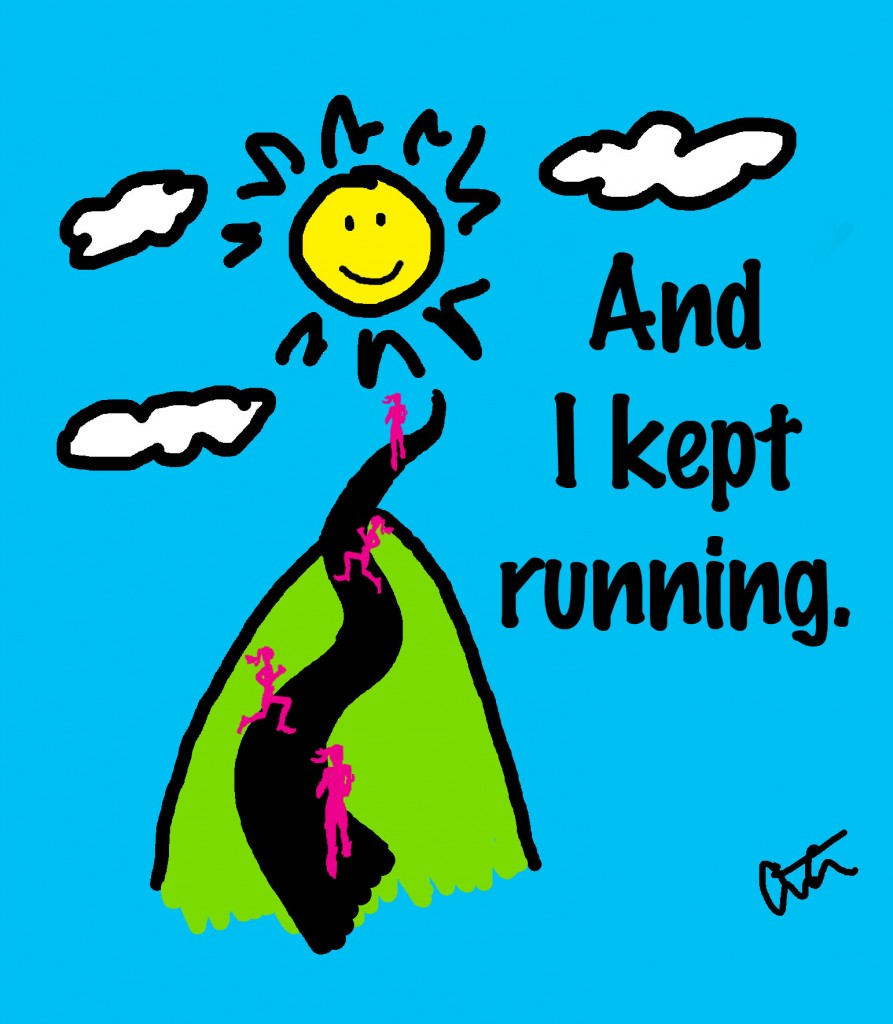
Quite honestly, you may wind up short along the way. A goal you don’t hit, eventually you will set your last PR…*single tear*. When you hit the climax, what the heck happens if you DON’T hit what, in your mind, was your ‘epic’?
You would be allowed to be disappointed. But I GUARANTEE you that you’re much higher up on the ‘epic scale’ than when you started. Running and training your @$$ off, you maybe didn’t hit the pinnacle you wanted, but dang-nam-it you improved.
You didn’t sit at mediocre. You TRIED.
If you’re going to do something, give it your all. If you truly want it, believe in it, and you find it rewarding…TRY for epic.
What holds most people back? Ultimately fear. Right behind it a lack of motivation…lol.
But I think fear is the root of it. Fear of the work it would take. Fear of failure. Fear you’re not good enough. Fear you’re not as good as you think you are…aha…that one!
That brings up the question: Would you rather stay at mediocre but live with the assumption that if you DID try then you would be awesome OR go out on a limb and try, then be faced with the reality that you didn’t quite measure up? Going with the first one will keep you in the safety bubble of mediocre.

Don’t let insecurities, fear, failures, hard work, REALLY hard work [umm, trust me, track workouts need a whole new word for REALLY. HARD. WORK.], and set-backs rob you from trying for YOUR epic.
Be different, test yourself, push yourself, be unique, FIND YOUR epic. Hell, go run. ![]()
1) Define what ‘epic’ would be for you? Pick a goal, it doesn’t necessarily have to be running related.
2) Define what falling short of that epic would mean to you?
Sure it sucks, but we CAN cope with sucky.
3) What has been something that’s held you back from getting to your epic, or holding you back from TRYING for your epic?



